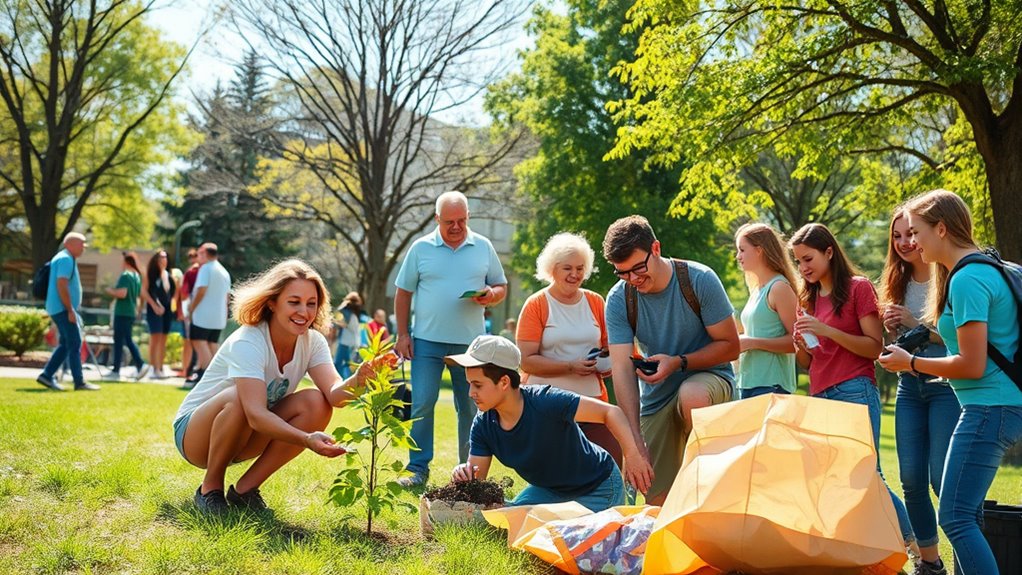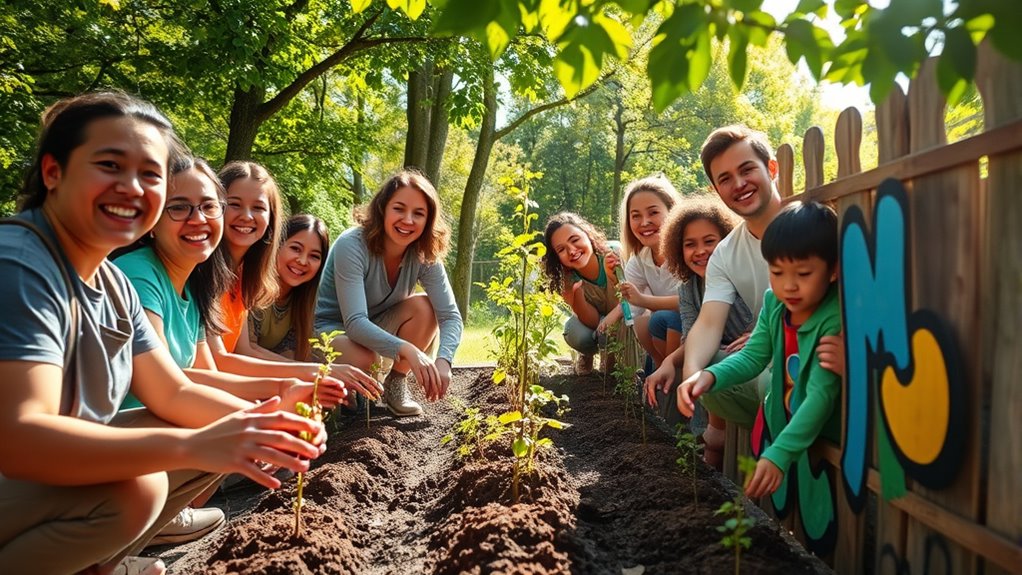Volunteering and community service can truly change lives and make a significant impact in your community. By engaging in these activities, you not only help others but also boost your own mental and physical health, build social connections, and create a sense of purpose. Plus, it looks great on your resume! As you explore different opportunities, you’ll discover how volunteering plays an essential role in fostering unity and driving positive change in society.
Key Takeaways
- Volunteering drives social movements, raising awareness and creating impactful changes in communities.
- Community service enhances mental health, reduces isolation, and fosters supportive social networks.
- Engaging in volunteer activities provides essential skills and strengthens resumes, boosting career prospects.
- Volunteers contribute significantly to nonprofit organizations, aiding in fundraising and advocacy efforts.
- Participating in community initiatives fosters unity, builds connections, and empowers individuals and families.
The Importance of Volunteerism in Modern Society

Volunteers have kickstarted numerous social movements, creating change by driving initiatives and raising awareness for pressing issues. When you engage in volunteer efforts, you contribute to community engagement, strengthening social bonds among diverse groups. This involvement not only fosters empathy but also guarantees the long-term sustainability of movements, as dedicated individuals maintain momentum. Additionally, volunteers play an essential role in fundraising, providing critical support to nonprofit organizations, and advocating for important causes. By participating in volunteerism, you’re not just donating your time; you’re actively shaping a better, more connected society. Furthermore, the average value of a volunteer hour in the US is approximately $29.95, highlighting the significant impact volunteers have on the nonprofit economy.
Benefits of Volunteering for Individuals and Communities

Volunteering offers a wealth of benefits that enhance both individual lives and the communities they serve.
For you, engaging in volunteer work can greatly boost your mental health by reducing stress and fostering positive emotions. It combats feelings of isolation, leading to a supportive network that uplifts your spirits. Additionally, volunteering strengthens social connections, allowing you to forge meaningful relationships with others. By participating in community service, you also gain access to reliable resources for new parents, which can be invaluable during the early stages of parenthood.
Physically, you’ll often find improved health, greater mobility, and better sleep.
Socially, volunteering strengthens your connections, helping you meet new people and develop essential skills.
On a personal level, it provides a sense of purpose and can enhance your career prospects by bolstering your resume.
Ultimately, your contribution not only enriches your life but also fosters community trust and improves the quality of life for everyone involved.
Demographic Trends in Volunteer Participation

Understanding demographic trends in volunteer participation reveals valuable insights into who engages in community service and how. In 2022, women greatly outnumbered men in volunteering, with around 7 million women compared to 4 million men on an average day. The highest volunteer rates were among those aged 65 and older, with 7.8% of women and 6.4% of men participating. Adults aged 45 to 54 also showed notable rates, with 5.0% of women and 3.7% of men volunteering. Over the last decade, overall volunteer rates have declined from 5.8% to 4.2%. Additionally, approximately 30.3% of Americans volunteer at least once a year, highlighting the ongoing importance of volunteerism in society. Generationally, Gen X leads in formal volunteering, while Baby Boomers excel in neighborly help, highlighting diverse engagement patterns across age groups.
Popular Volunteering Activities and Their Impact

As you explore popular volunteering activities, you’ll find that they not only serve communities but also foster personal growth and well-being.
Engaging in community health initiatives, like vaccination drives and mental health support, empowers both volunteers and the people they help. Volunteering in these areas is linked to decreased risk of high blood pressure, promoting healthier lifestyles for both volunteers and beneficiaries.
Environmental conservation activities, such as beach clean-ups and reforestation, not only protect ecosystems but also deepen your connection to nature.
In education and literacy programs, tutoring and mentoring can greatly enhance life outcomes for disadvantaged youth.
Additionally, community building through food banks and shelters creates unity and support networks.
Each of these activities allows you to make a tangible difference while gaining valuable skills and experiences that enrich your life.
Challenges Faced by Volunteers and Organizations

While many people are enthusiastic to lend a helping hand, both volunteers and organizations face considerable hurdles in the process. Recruiting volunteers has become increasingly challenging, especially post-pandemic, with nearly half of nonprofit CEOs reporting difficulties.
Economic factors, like rising costs and competition for resources, further strain volunteer recruitment and retention. You may notice that existing volunteers are stretched thin, leading to burnout as organizations depend more on them.
Additionally, many nonprofits struggle with funding, which limits their ability to manage and engage volunteers effectively. Adapting to new technologies for virtual volunteering can be intimidating, and communication barriers often hinder collaboration.
These challenges can considerably impact the services provided to communities that rely on volunteer support.
The Future of Volunteering: Trends and Innovations

The future of volunteering is poised for transformation, driven by innovative trends and technologies that reshape how people engage with their communities.
Virtual volunteering is expanding, attracting individuals with busy schedules and mobility issues, while offering diverse opportunities across the globe. You can easily connect with nonprofits through platforms like VolunteerMatch, enhancing accessibility and inclusivity.
Skills-based volunteering is also on the rise, allowing you to develop professional skills while making a significant impact. Meanwhile, micro-volunteering offers flexible, bite-sized tasks that fit into your schedule.
As nonprofits prioritize volunteer well-being with supportive environments and wellness programs, you’ll find that your contributions are recognized and appreciated, fostering a deeper sense of community and connection.
Frequently Asked Questions
How Can I Find Volunteer Opportunities in My Area?
To find volunteer opportunities in your area, start by checking online platforms like VolunteerMatch or Idealist.
Local nonprofits often have openings that match your interests, so visit their websites or contact them directly.
Community boards and libraries frequently post listings, too.
Don’t forget to explore government websites for regional opportunities.
Finally, consider reaching out to organizations like United Way for an extensive list tailored to your location and interests.
What Skills Are Most Valued by Volunteer Organizations?
You might think that technical skills are the most valued by volunteer organizations, but soft skills often take precedence.
Communication, teamwork, and adaptability are essential for effective collaboration. Organizations also appreciate compassion, a strong work ethic, and a positive attitude.
If you’re looking to stand out, focus on developing leadership abilities and problem-solving skills. These qualities not only enhance your volunteer experience but also make a lasting impact on the communities you serve.
Are There Age Restrictions for Volunteering?
Yes, there are age restrictions for volunteering, and they vary by organization. Some programs require you to be at least 18, while others accept teens as young as 13.
For instance, the Austin Public Library allows youth volunteers aged 13 to 17, and St. David’s Medical Center has a minimum age of 15.
It’s essential to check each organization’s specific requirements before applying, as some may also need parental consent for younger volunteers.
Can Volunteering Lead to Job Offers or Internships?
Did you know that candidates with volunteer experience have a 27% better chance of landing a job?
Volunteering can definitely lead to job offers or internships, as it enhances your skills and showcases your commitment to community and teamwork.
Employers often value the soft skills you gain through volunteer work.
Plus, it’s a great way to network and make connections that could open doors to future career opportunities.
How Do I Track My Volunteer Hours for Recognition?
To track your volunteer hours for recognition, start by choosing a method that works for you. You can use manual logs, spreadsheets, or digital software.
Make certain to log your hours consistently and consider using mobile apps for ease. Regularly analyze your tracked hours to guarantee accuracy and gather data for any recognition applications.
Don’t forget to keep a record of any feedback or experiences that highlight your contributions.
Conclusion
To sum up, volunteering not only enriches your life but also strengthens communities. Did you know that about 30% of Americans engage in some form of volunteer work each year? This statistic highlights the collective impact you can have when you join forces with others. As you consider your own involvement, remember that every hour spent volunteering creates ripples of positive change, fostering a spirit of collaboration and compassion in society. Your efforts truly make a difference!









